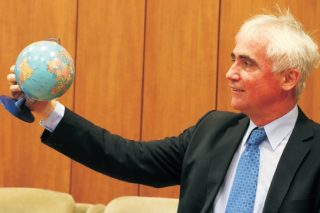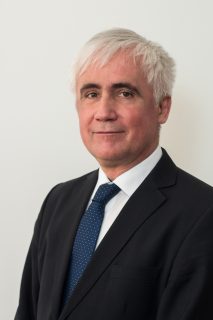Tibor Bartha, the vice-rector for international affairs, the Head of the Department of Physiology and Biochemistry, who is dominant in a group of friends. He has a sparkling personality, and people around him like to be entertained by his stories and the wisdom of his jokes. The following is an extract of our interview with him.
– Your father, Dr Adorján Bartha first developed the vaccine against Aujeszky’s disease in 1961. Thanks to this, the University of Veterinary Medicine, where he was working since 1949, became well known all over the world. To his son, this must have been an advantage when meeting people from other veterinary establishments.
 – Oh, that is not so easy! I have seen the difficult life of my father, who was always ahead of his time. His scientific results were accepted only 10 years after discovery. There was a constant fight between him and the surrounding world. My life is indeed much easier. Meeting veterinarians regardless it is in Europe or China when they realize that he was my father, the formal behaviour changes to a friendly one immediately. His discoveries are taught to undergraduate students. Furthermore, he often repeated his funny statement: he claimed, that he had two major achievements in 1961, he discovered the K-61 virus strain, and his son (I) was born.
– Oh, that is not so easy! I have seen the difficult life of my father, who was always ahead of his time. His scientific results were accepted only 10 years after discovery. There was a constant fight between him and the surrounding world. My life is indeed much easier. Meeting veterinarians regardless it is in Europe or China when they realize that he was my father, the formal behaviour changes to a friendly one immediately. His discoveries are taught to undergraduate students. Furthermore, he often repeated his funny statement: he claimed, that he had two major achievements in 1961, he discovered the K-61 virus strain, and his son (I) was born.
– Was is your only option to become a vet? Was it genetically determined?
– Not at all. I was very good in 3 subjects: math, chemistry, and physics. As a teenager, I was already planning to choose a higher education institution where I can learn creative science. My theory was, that in the secondary school discoveries over a 100 years are taught in mathematics. In physics, they teach what Newton discovered 400 years ago. Chemistry looks back a 100 years, while in biology discoveries of the past 50 years are important. I came to the conclusion, that the field of biology is the one, where great discoveries due. So I had to make a decision, whether I want to become a medical doctor, a vet, or a biologist. It was my father’s suggestion that I should become a vet because this background leaves me the freedom to choose from many paths. He barely gave his advise, but when he did, then it was always very useful, smart and wise.
 – What is your field of interest in research where you had the most successful achievements?
– What is your field of interest in research where you had the most successful achievements?
– From scientific point of view, my post doc years at the Harvard Medical school were the best. We were dealing with an amino acid which is not part of the first 20 ones. This is a special cysteine which contains selenium. We were interested in the role of this amino acid in thyroid hormone metabolism. Besides the scientific results, it was nice to gain research experiences in such a high intellectually tense environment. Doing my best, I was accepted by the Harvard researchers and became a member of their team. I probably wouldn’t be able to live my entire life in the United States, but I am very happy that I could work for two years in such a well-organized society. I could completely focus on my research work, there were no deviating factors.
– Will the frontal lecturing survive despite the digital revolution and the spread of the online available information?
– We are facing a fundamental change in the university education, however, nothing will disappear, neither classroom teaching. Any significant technological step causes major changes including communication technology. The appearance of verbal communication must have been a great innovation, further ones are the appearance of writing, the visual culture, the digital time, and now we are close to the era of responding devices. This kind of progress cannot be stopped; we must adapt to the new environment. We have to underline, that these changes did not make earlier communication techniques to disappear. We are still reading, even though movies available. Only the proportions change, and the society incorporates the social heritages based on its needs. I don’t think that the end is at hand, but the world will become a better and better place, and we face more and colorful experiences. Yes, everything will change. The students are already different. I consider myself as a member of generation X, while the students I recently teach belong to generation Z. We cannot convert into a Z generation student, we will have to adapt to them.
– What do you do outside the university?
– I am happy to be the layman, the president of the presbyterium of the Fasor Lutheran church. Our gothic revival church is beautiful, we achieved a lot for the local community, for example, we converted the deserted area next to the church into a Reformation Memorial Park. I like to travel very much, so I am happy to be the vice-rector of international relations. I like fast sport like bicycle riding or skiing.
Interview: Gusztáv Balázs, editor chief of the UNIVET Magazine.
